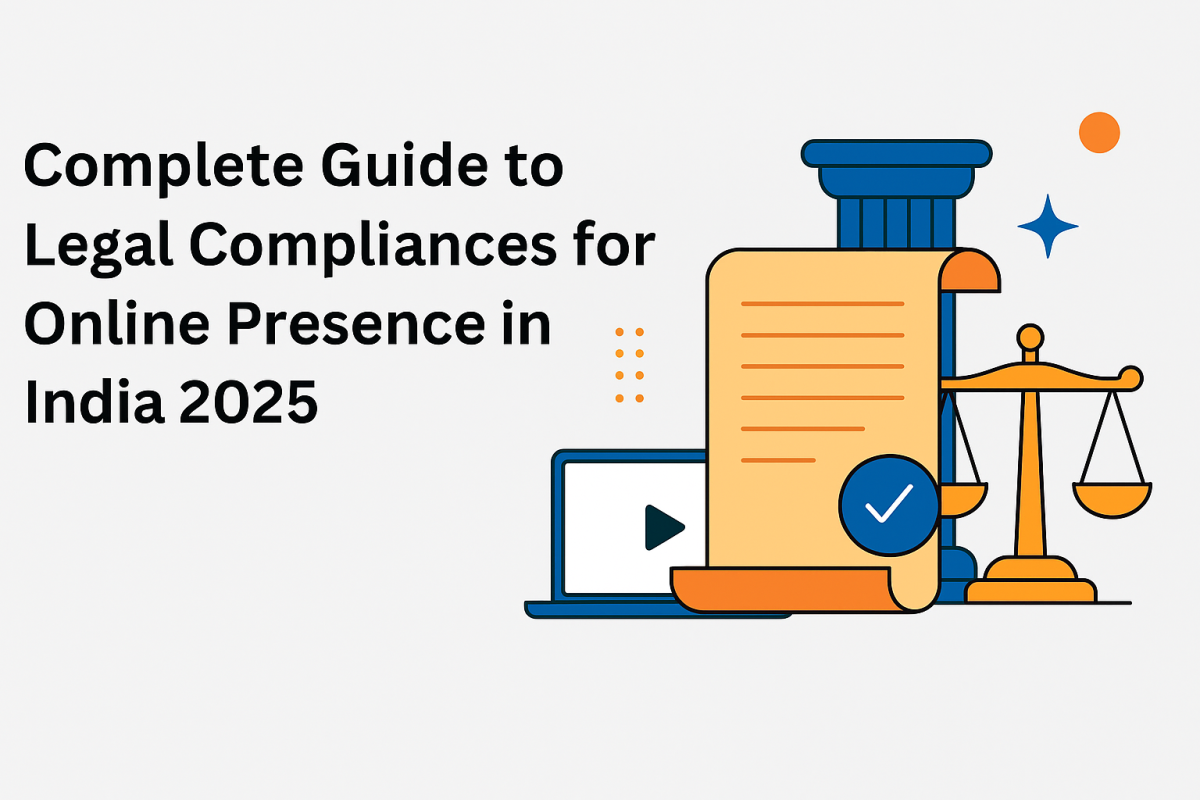Complete Guide to Legal Compliances for Online Presence in India 2025
Published on October 8, 2025 | By Systron Micronix Team

In the digital era, establishing an online presence—whether through a simple website, blog, or full-fledged e-commerce platform—is essential for businesses in India. However, with great connectivity comes great responsibility. As of 2025, the regulatory landscape has evolved significantly, driven by the Digital Personal Data Protection (DPDP) Act, 2023, updates to the Consumer Protection Act, and stringent GST enforcement. Non-compliance can lead to hefty fines, legal battles, and loss of customer trust. This comprehensive guide covers all key compliances for online presence in India, helping you build a secure, legal digital footprint.
1. Business Registration and Legal Structure
Before going online, your business must be legally recognized. This foundational step ensures legitimacy and protects against liabilities.
-
- Choose a Legal Entity: Opt for Sole Proprietorship (simple, but unlimited liability), Limited Liability Partnership (LLP; flexible for SMEs), or Private Limited Company (ideal for scaling, with limited liability). Register with the Ministry of Corporate Affairs (MCA) via the Registrar of Companies (ROC).
- Obtain Key Identifiers: Secure a Digital Signature Certificate (DSC), Director Identification Number (DIN), Permanent Account Number (PAN), and Tax Deduction and Collection Account Number (TAN).
- Trade License: Get this from local municipal authorities to validate your business premises.
For e-commerce, additional sector-specific licenses like FSSAI (for food) or Legal Metrology Certificate (for packaged goods) may apply.
2. Taxation and GST Compliance
Taxation is non-negotiable for online operations. The Goods and Services Tax (GST) regime simplifies but demands meticulous record-keeping.
-
- GST Registration: Mandatory if annual turnover exceeds ₹40 lakh for goods or ₹20 lakh for services. Register on the GST portal for CGST, SGST, and IGST.
- Filing Returns: Submit monthly/quarterly returns with details of sales, purchases, and input tax credits. Use digital invoicing for audit trails.
- Other Taxes: Comply with Income Tax Act, 1961, for business income reporting.
Penalties for non-compliance include fines up to 100% of tax due. Automate with accounting software to stay ahead.
3. Data Protection and Privacy Laws
With the DPDP Act fully enforced in 2025, protecting personal data is paramount. This applies to all websites collecting user info.
-
- Information Technology (IT) Act, 2000: Governs electronic contracts, digital signatures, and data security. Section 43 requires compensation for data breaches.
- DPDP Act, 2023: Mandates consent for data processing, data minimization, and breach notifications within 72 hours. Appoint a Data Protection Officer (DPO) for significant data handlers.
- Best Practices: Use end-to-end encryption, multi-factor authentication, and regular audits. Develop a privacy policy detailing data usage and user rights (access, deletion).
Global businesses must align with GDPR-like standards for cross-border data flows.
4. Consumer Protection Regulations
The Consumer Protection Act, 2019, and E-Commerce Rules, 2020, safeguard buyers in online transactions.
-
- Transparency: Disclose product details, prices, origins, and warranties clearly.
- Grievance Redressal: Resolve complaints within 48 hours; appoint a Grievance Officer.
- Unfair Practices: Prohibit manipulative pricing, deceptive ads, or fake reviews.
- Return/Refund Policy: Clearly state terms, including timelines (e.g., 7-30 days).
For e-commerce, ensure fair vendor selection and no inventory control in marketplace models.
5. Intellectual Property Rights (IPR)
Protect your brand and content to avoid infringements.
-
- Trademarks and Copyrights: Register with the Intellectual Property Office. Conduct searches to prevent conflicts.
- Monitoring: Use tools to scan for counterfeits; issue cease-and-desist notices for violations.
- Contracts: Include IP clauses in supplier and employee agreements.
IPR compliance boosts investor confidence and revenue.
6. Website-Specific Compliances
Beyond business ops, your site itself must meet standards for trust and accessibility.
-
- Privacy Policy and Cookie Consent: Mandatory disclosure of data practices; obtain explicit consent for cookies.
- Terms of Service and Disclaimers: Outline user responsibilities and liabilities.
- Accessibility: Follow WCAG guidelines and Indian standards for disabled users.
- Security: Implement SSL certificates, secure gateways, and PCI DSS for payments.
- Legal Disclosures: Display business details (name, address, contact) in the footer.
Update policies annually or with law changes.
7. Payment and Financial Compliances
Secure transactions are key for e-commerce.
-
- Payment and Settlement Systems Act, 2007: Use RBI-approved gateways; maintain nodal accounts.
- PCI DSS: Ensure card data security for online payments.
- Cryptocurrency: If accepted, comply with emerging RBI guidelines (as of 2025, limited but regulated).
Integrate UPI and other digital methods compliantly.
8. E-Commerce Specific Regulations
For online sellers:
-
- FDI Policy: 100% FDI allowed in marketplace models, but no inventory ownership.
- Legal Metrology Act, 2009: Accurate labeling of weights, measures, and expiry dates.
- Intermediary Liability (IT Act Section 79): Platforms must exercise due diligence to avoid liability for user content.
Monitor updates via government portals.
9. Risk Mitigation and Best Practices
Avoid pitfalls with:
-
- Regular audits and legal consultations.
- Automated tools for GST and data compliance.
- Training staff on cybersecurity and consumer rights.
- Annual policy reviews for evolving laws like DPDP.
Common risks: Data breaches (fines up to 4% of turnover) and GST errors (suspension).
Conclusion: Stay Compliant with Systron
Navigating India’s 2025 compliance landscape ensures your online presence thrives without legal hurdles. At Systron Micronix, we power your digital journey with secure, scalable hosting solutions and dedicated servers integrated with compliance-ready tools like SSL, backups, and cloud infrastructure. Visit systron.net to get started—your compliant online empire awaits!
Disclaimer: This guide is for informational purposes. Consult a legal expert for tailored advice.
